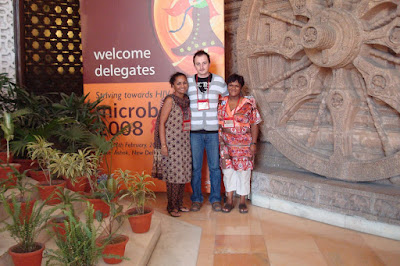
Renegade Daughter and Microbicide DIVA
Makes Subcontinental Advocacy Magic
Proves You CAN Go Home
And Walk the Talk
Correspondence from IRMA advocates
by way of India
M2008 memories and the path forward
by Shaleena Theophilus

Thanks to the generous funding by
IRMA through the John Shaw Memorial Scholarship, I was able to attend the
Microbicides 2008 conference that was held in
New Delhi.
For me, these conferences are so amazing because you not only get to attend sessions on the latest in the field of microbicides research, you also get to genuinely
interact with people from all sectors invested in microbicides advocacy from around the globe.
How amazing is that!
I did my usual conference routine of trying to attend at least one session from every track. I had to stretch my mind a bit for the basic and clinical sciences, but overall, the information that I brought back was useful and informative for the work that I will be doing here in Canada.
Now, being an Indo-Canadian, this conference held an added importance to me. I had not been back to India for 13 years (as my family who still live there reminded on every occasion possible) and seeing how it has changed and the impact that this disease has had was something that I find hard to describe. In Canada, there are a handful of us -- South Asians working in this field. I  found it inspiring to be surrounded by other Indians who are not only committed to the cause, but who also have an interest in microbicides.
found it inspiring to be surrounded by other Indians who are not only committed to the cause, but who also have an interest in microbicides.
Heading off after the conference, I had wished that more delegates could have seen Delhi beyond the confines of the conference, and experienced India in all of its intensity. I left to visit the plethora of aunties and uncles in the south, and I found that attending Microbicides 2008 afforded me the opportunity to talk with many of my relatives about these issues. I secretly chuckle when I think of my mother finding out that I talked about sex to her childhood classmate. However, I guess it is the smallest things that can have the biggest impact, whether that be giving a renegade daughter a secret pleasure or changing a person’s perception and actions around this disease.
Back in Canada, I have already had the opportunity to share what I had learned with the Canadian Microbicides Action Plan steering committee, as well as the Microbicides Advocacy Network Group. I will also be incorporating this information into upcoming presentations, the next of which will be held for community members in Nova Scotia at their regional skills building conference.
I look forward to the next conference in Pittsburgh. More importantly, I look forward to one day showing community members what a microbicide looks like and how to use it both vaginally and rectally as the newest prevention option available to them!

 achievement. There were also many youths, especially really dynamic ones from
achievement. There were also many youths, especially really dynamic ones from 





